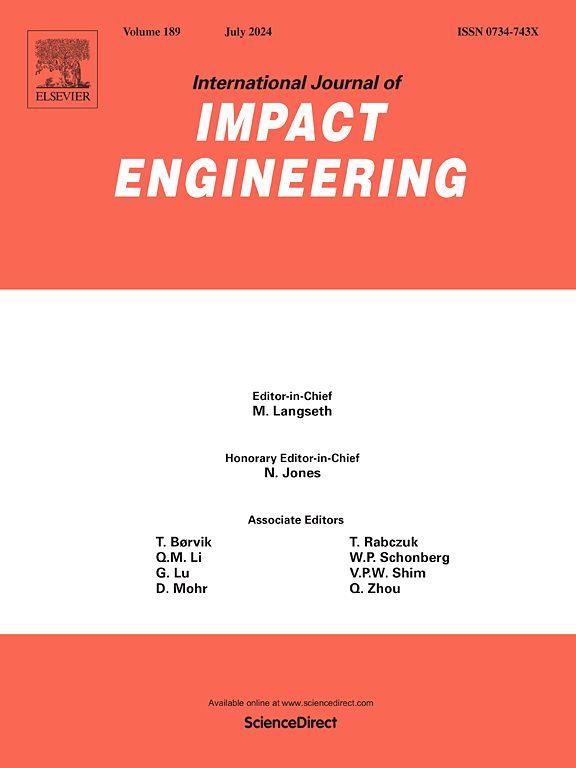High strain-rate fracture behavior of a hollow projectile
IF 5.1
2区 工程技术
Q1 ENGINEERING, MECHANICAL
International Journal of Impact Engineering
Pub Date : 2024-10-06
DOI:10.1016/j.ijimpeng.2024.105138
引用次数: 0
Abstract
In this paper, a hollow projectile made of AISI4340 steel was fabricated based on an arbitrary warhead shape, and high-speed impact tests were performed according to various target encounter conditions including velocity and angle. In order to characterize the dynamic fracture behavior, tensile tests were performed on various notch specimens under three strain rates (10–3 s-1, 100 s-1, 103 s-1), and the stress state histories of the specimens were calibrated through a hybrid experimental-numerical analysis. In particular, for the intermediate (100 s-1) and high (103 s-1) strain rate conditions, the local temperature rose due to adiabatic heating until fracture was experimentally measured, and the thermal softening behavior determined from the inverse optimization technique was considered for the dynamic constitutive model. For the comparison with the high-speed impact test results, a rate-dependent ductile fracture model was utilized for numerical simulation. Considering that the model parameters were calibrated with the thermal softening effect, the proposed fracture model implicitly takes temperature into account. The deformation and fracture modes of the projectile from experimental and numerical study showed very good agreement under all impact conditions. It was confirmed that the softening of a material by adiabatic heating should be considered along with strain rate hardening in dynamic fracture simulation.
空心弹丸的高应变速率断裂行为
本文根据弹头的任意形状制作了由 AISI4340 钢制成的空心弹丸,并根据各种目标遭遇条件(包括速度和角度)进行了高速冲击试验。为了表征其动态断裂行为,在三种应变速率(10-3 s-1、100 s-1、103 s-1)下对各种缺口试样进行了拉伸试验,并通过实验-数值混合分析对试样的应力状态历史进行了校准。其中,在中应变率(100 s-1)和高应变率(103 s-1)条件下,通过实验测量了绝热加热导致的局部温度升高直至断裂,并在动态构成模型中考虑了反优化技术确定的热软化行为。为了与高速冲击试验结果进行比较,采用了与速率相关的韧性断裂模型进行数值模拟。考虑到模型参数是根据热软化效应校准的,因此所提出的断裂模型隐含地考虑了温度因素。在所有冲击条件下,实验和数值研究得出的弹丸变形和断裂模式都非常吻合。实验证实,在动态断裂模拟中,材料的绝热加热软化应与应变速率硬化一并考虑。
本文章由计算机程序翻译,如有差异,请以英文原文为准。
求助全文
约1分钟内获得全文
求助全文
来源期刊

International Journal of Impact Engineering
工程技术-工程:机械
CiteScore
8.70
自引率
13.70%
发文量
241
审稿时长
52 days
期刊介绍:
The International Journal of Impact Engineering, established in 1983 publishes original research findings related to the response of structures, components and materials subjected to impact, blast and high-rate loading. Areas relevant to the journal encompass the following general topics and those associated with them:
-Behaviour and failure of structures and materials under impact and blast loading
-Systems for protection and absorption of impact and blast loading
-Terminal ballistics
-Dynamic behaviour and failure of materials including plasticity and fracture
-Stress waves
-Structural crashworthiness
-High-rate mechanical and forming processes
-Impact, blast and high-rate loading/measurement techniques and their applications
 求助内容:
求助内容: 应助结果提醒方式:
应助结果提醒方式:


